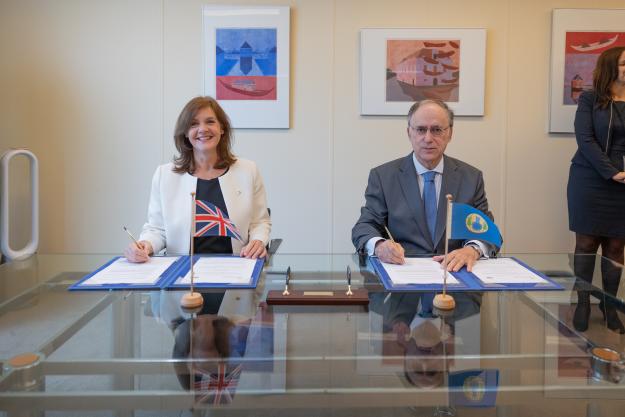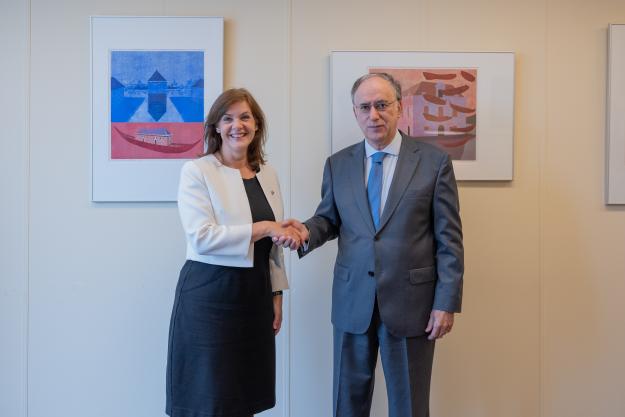
H.E. Ms Joanna Roper CMG, Permanent Representative of the United Kingdom of Great Britain and Northern Ireland to the OPCW, and Ambassador Fernando Arias, OPCW Director-General
THE HAGUE, Netherlands— 11 October 2023—The Government of the United Kingdom of Great Britain and Northern Ireland has voluntarily contributed more than €1.1 million to three trust funds of the Organisation for the Prohibition of Chemical Weapons (OPCW).
A contribution of more than €700,000 will be allocated to the OPCW Trust Fund for Training, part of which will be used to enhance the Secretariat’s ability to respond to the threat of the use of biotoxins as weapons. This includes development of comprehensive analytical techniques for identifying biotoxins in environmental and biomedical samples, utilising the laboratory facilities at the OPCW Centre for Chemistry and Technology (ChemTech Centre). This project also aims at strengthening the relationship between the OPCW and the United Nations Secretary-General Mechanism, and laboratories in both networks. The rest of the voluntary contribution to the OPCW Trust Fund for Training will be used to assess and enhance the capacities of analytical laboratories in African and Latin American Member States towards OPCW designation.
An amount of more than €230,000 will be earmarked for assistance and protection activities for Ukraine through the OPCW Trust Fund for the Implementation of Article X.
A contribution of more than €230,000 will be allocated to the OPCW Trust Fund for Syria Missions and will be used towards the full elimination of the Syrian Chemical Weapons Programme as well as establishing facts surrounding the alleged use of chemical weapons in Syria, in accordance with the Chemical Weapons Convention, relevant decisions of the policy-making organs of the OPCW and resolutions of the United Nations Security Council.
The voluntary contributions were formalised on 9 October 2023 in a signing ceremony held between the Ambassador, Permanent Representative of the United Kingdom of Great Britain and Northern Ireland to the OPCW, H.E. Ms Joanna Roper CMG, and the OPCW Director-General, Ambassador Fernando Arias, at the Organisation’s Headquarters in The Hague.
“The UK is proud to make voluntary contributions again this year to support OPCW’s critical mission to permanently and verifiably eliminate all chemical weapons,” said Ambassador Roper.
“I am delighted that the UK contribution this year will assist laboratories in Latin American and African regions working towards OPCW-designated status; deliver activities related to assistance and protection in Ukraine; support OPCW missions in Syria and enhance the Secretariat’s ability to respond to the biotoxins threat. We look forward to reviewing the outcomes of this important UK sponsored work,” she emphasised.
The Director-General stated: “I express my sincere appreciation to the UK for its strong financial and political support to the OPCW’s mission to permanently eradicate chemical weapons. These new contributions will help the Organisation to continue its critical work to support the implementation of the Chemical Weapons Convention and help uphold the universal norm against the use of chemical weapons.”

H.E. Ms Joanna Roper CMG, Permanent Representative of the United Kingdom of Great Britain and Northern Ireland to the OPCW, and Ambassador Fernando Arias, OPCW Director-General
Background
The United Kingdom of Great Britain and Northern Ireland has been an active member of the OPCW since the Chemical Weapons Convention entered into force in 1997. The United Kingdom is a member of the OPCW Executive Council, the OPCW’s executive organ, which is responsible for promoting the effective implementation of and compliance with the Chemical Weapons Convention as well as supervising the activities of the Organisation’s Technical Secretariat.
The OPCW Centre for Chemistry and Technology, which was inaugurated on 12 May 2023, enhances OPCW’s ability to conduct chemical research and analysis. This significantly reinforces the Organisation’s verification regime and inspection capabilities of chemical industries around the world. In addition, an increasing number of capacity development activities are being delivered through the Centre, including chemical emergency response trainings and analytical skills development courses for experts from Member States.
The Declaration Assessment Team was established in 2014 to engage the relevant Syrian authorities to resolve the identified gaps, inconsistencies, and discrepancies in the Syrian declaration. The Fact-Finding Mission was set up in the same year in response to persistent allegations of chemical weapon attacks in Syria, with the task to establish facts surrounding allegations of the use of toxic chemicals for hostile purposes. The Investigation and Identification Team began its work in 2019 and is responsible for identifying the perpetrators of the use of chemical weapons in Syria.
Under Article X of the CWC, Member States “have the right to participate in, the fullest possible exchange of equipment, material and scientific and technological information concerning means of protection against chemical weapons.”
As the implementing body for the Chemical Weapons Convention, the OPCW, with its 193 Member States, oversees the global endeavour to permanently eliminate chemical weapons. Since the Convention’s entry into force in 1997, it is the most successful disarmament treaty eliminating an entire class of weapons of mass destruction.
On 7 July 2023, the OPCW confirmed that all chemical weapons stockpiles declared by the 193 States Parties to the Chemical Weapons Convention since 1997 — totalling 72,304 metric tonnes of chemical agents — have been irreversibly destroyed under the OPCW’s strict verification regime.
For its extensive efforts in eliminating chemical weapons, the OPCW received the 2013 Nobel Peace Prize.
More Information
United Kingdom of Great Britian and Northern Ireland | OPCW
Article X – Assistance and Protection Against Chemical Weapons | OPCW
